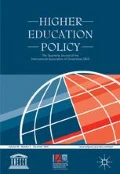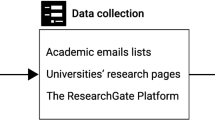Abstract
We analyze a series of interviews with Estonian humanities researchers to explore topics related to the beginning of academic careers and the relationships with supervisors and mentors. We show how researchers strive to have meaningful relationships and produce what they consider quality research in the conditions of a system that is very strongly oriented towards internationalization and project-based funding, where their efforts are compromised by a lack of policies helping them establish a stable position in academia. Leaving researchers to face these obstacles alone places a great burden on them and may lead to a loss of talent in academia. Identifying and addressing these issues is thus important for both the well-being of early career researchers and the future of academia.
Similar content being viewed by others
Notes
In 2012, institutional research funding and personal research funding, two new instruments combining institutional and project-based elements, were introduced in Estonia with the aim (among others) of decreasing fragmentation and improving coordination between funding sources by replacing several of the previously existing funding instruments. As our interviews were mostly conducted before their introduction, we do not discuss them in the article. It is not yet clear whether they will be able to solve the problems discussed. For example, Raudla et al. (2014, 2, 16 and 24) point out that they may exacerbate the problem of funding fluctuations for groups that fail to secure institutional research funding during a given year’s application round. The number of failed applications is considerable: in 2014, the failure rate of institutional research funding applications was 40% overall and 52% for the humanities and social sciences (Estonian Research Council’s Memorandum, 2014, 1); for personal research funding applications, the overall failure rate was 87% (Estonian Research Council’s Memorandum, 2014, 8).
References
Åkerlind, G.S. (2005) ‘Postdoctoral researchers: Roles, functions and career prospects’, Higher Education Research and Development 24 (1): 21–40.
Austin, A.E. (2002) ‘Preparing the next generation of faculty: Graduate school as socialization to the academic career’, The Journal of Higher Education 73 (1): 94–122.
Bazeley, P. (2003) ‘Defining ‘early career’ in research’, Higher Education 45 (3): 257–279.
Brew, A., Boud, D. and Namgung, S.U. (2011) ‘Influences on the formation of academics: The role of the doctorate and structured development opportunities’, Studies in Continuing Education 33 (1): 51–66.
Charmaz, K. (2006) Constructing Grounded Theory. A Practical Guide through Qualitative Analysis, London: Sage Publications.
Curaj, A., Scott, P., Vlasceanu, L. and Wilson, L. (eds.) (2012) European Higher Education at the Crossroads: Between the Bologna Process and National Reforms, Dordrecht: Springer.
Estonian Research Council’s Memorandum on the year 2014 application round for institutional research funding, core infrastructure funding and personal research funding (2014) Tartu: Ministry of Education and Research, http://www.etag.ee/wp-content/uploads/2014/03/IUT_PUT-m%C3%A4rgukiri.pdf (in Estonian), accessed 14 May 2014.
Estonian Research and Development and Innovation Strategy 2007–2013 ‘Knowledge based Estonia’. Report on achieving the objectives and implementing the strategy in 2012 (2013) Tartu: Ministry of Education and Research, http://www.hm.ee/index.php?popup=download&id=12338, accessed 1 May 2014.
Estonian Research and Development and Innovation Strategy 2014–2020 ‘Knowledge based Estonia’ (2014) Tartu: Ministry of Education and Research, http://www.hm.ee/sites/default/files/tai_strateegia.pdf (in Estonian), accessed 14 August 2014.
Fox, M.F. and Stephan, P.E. (2001) ‘Careers of young scientists: Preferences, prospects and realities by gender and field’, Social Studies of Science 31 (1): 109–122.
Frischer, J. and Larsson, K. (2000) ‘Laissez-faire in research education — an inquiry into a Swedish doctoral program’, Higher Education Policy 13 (2): 131–155.
Fuchs, S. (1992) The Professional Quest for Truth: A Social Theory of Science and Knowledge, Albany: State University of New York Press.
Garforth, L. and Červinková, A. (2009) ‘Times and Trajectories in Academic Knowledge Production’, in U. Felt (ed.) Knowing and Living in Academic Research: Convergence and Heterogeneity in Research Cultures in the European Context, Prague: Institute of the Sociology of the Academy of Sciences of the Czech Republic, pp. 169–224.
Hasse, C. and Trentemøller, S. (2008) Break the pattern! A critical enquiry into three scientific workplace cultures: Hercules, caretakers and worker bees, Tartu: UPGEM, http://cordis.europa.eu/documents/documentlibrary/116810421EN6.pdf, accessed 1 May 2014.
Hasse, C., Sinding, A.B. and Trentemøller, S. (eds.) (2008a) Draw the line! Universities as workplaces for male and female researchers in Europe, Tartu: Tartu University Press, http://cordis.europa.eu/documents/documentlibrary/116810481EN6.pdf, accessed 1 May 2014.
Hasse, C., Trentemøller, S. and Sinding, A.B. (eds.) (2008b) Draw the line! International Conference, Copenhagen 2008, Papers, Proceedings and recommendations, Tartu: UPGEM, http://cordis.europa.eu/documents/documentlibrary/116810471EN6.pdf, accessed 1 May 2014.
Laudel, G. (2006) ‘The art of getting funded: How scientists adapt to their funding conditions’, Science and Public Policy 33 (7): 489–504.
Laudel, G. and Gläser, J. (2008) ‘From apprentice to colleague: The metamorphosis of early career researchers’, Higher Education 55 (3): 387–406.
Lepori, B., van den Besselaar, P., Dinges, M., Potì, B., Reale, E., Slipersæter, S., Thèves, J. and van der Meulen, B. (2007) ‘Comparing the evolution of national research policies: What patterns of change?’ Science and Public Policy 34 (6): 372–388.
Lepori, B., Masso, J., Jabłecka, J., Sima, K. and Ukrainski, K. (2009) ‘Comparing the organization of public research funding in Central and Eastern European countries’, Science and Public Policy 36 (9): 667–681.
Lõhkivi, E., Velbaum, K. and Eigi, J. (2012) ‘Epistemic injustice in research evaluation: A cultural analysis of the humanities and physics in Estonia’, Studia Philosophica Estonica 5 (2): 108–132.
Masso, J. and Ukrainski, K. (2009) ‘Competition for public project funding in a small research system: The case of Estonia’, Science and Public Policy 36 (9): 683–695.
Nerad, M. (2004) ‘The PhD in the US: Criticisms, facts, and remedies’, Higher Education Policy 17 (2): 183–199.
Põllo, H. (2013) Description of the Estonian Higher Education System, Tartu: Ministry of Education and Research, http://www.hm.ee/index.php?popup=download&id=12349, accessed 13 August 2014.
Radosevic, S. and Lepori, B. (2009) ‘Public research funding systems in Central and Eastern Europe: Between excellence and relevance: introduction to special section’, Science and Public Policy 36 (9): 659–666.
Rannala, R. (2009) ERAWATCH country report 2009: Analysis of policy mixes to foster R&D investment and to contribute to the ERA. Estonia, Luxembourg: Office for Official Publications of the European Communities, http://erawatch.jrc.ec.europa.eu/erawatch/opencms/information/reports/countries/ee/report_mig_0001, accessed 4 May 2014.
Raudla, R., Karo, E., Kattel, R. and Valdmaa, K. (2014) Detsentraliseeritud konkurentsipõhise teadusrahastuse mõju finantsjuhtimisele Eesti ülikoolides, TIPS poliitikaanalüüs, Tartu and Tallinn: Teadus- ja innovatsioonipoliitika seireprogramm TIPS, http://www.tips.ut.ee/index.php?module=32&op=1&id=3657 (in Estonian), accessed 1 May 2014.
Standard of Higher Education. Government of the Republic Regulation No 178 of 18 December 2008, RT I 2008, 57, 322 (entry into force 01.01. 2009), (2008) https://www.riigiteataja.ee/akt_seosed.html?id=129102013009&vsty=TOLK, accessed 18 May 2014.
Strategy for the Internationalization of Estonian Higher Education over the years 2006–2015 (2007) Tartu: Ministry of Education and Research, http://www.studyinestonia.ee/images/tekstid/esthestrategy.doc, accessed 14 August 2014.
Strauss, A. and Corbin, J. (1994) ‘Grounded theory methodology. An overview’, in N.K. Denzin and Y.S. Lincoln (eds.) Handbook of Qualitative Research, Thousand Oaks: Sage Publications, pp. 273–285.
Tina, A. (2008) ‘Kahetsükliline kõrgharidus ehk 3+2 süsteem’, in A. Valk (ed.) Bologna protsess Eestis 2004–2008, Tallinn: SA Archimedes, pp. 13–17, http://www.hm.ee/index.php?popup=download&id=8966 (in Estonian), accessed 1 May 2014.
Traweek, S. (1988) Beamtimes and Lifetimes. The World of High Energy Physicists, Cambridge and London: Harvard University Press.
Universities Act, RT I (13 March 2014) 77, https://www.riigiteataja.ee/en/eli/521032014002/consolide, accessed 15 May 2014.
Vaht, G., Tüür, L. and Kulasalu, Ü. (2010) Higher Education in Estonia, 4th edn., Tallinn: Archimedes Foundation, http://www2.archimedes.ee/enic/File/Higher_Education_in_Estonia_2010.pdf, accessed 1 May 2014.
Author information
Authors and Affiliations
Rights and permissions
About this article
Cite this article
Eigi, J., Põiklik, P., Lõhkivi, E. et al. Supervision and Early Career Work Experiences of Estonian Humanities Researchers Under the Conditions of Project-based Funding. High Educ Policy 27, 453–468 (2014). https://doi.org/10.1057/hep.2014.21
Published:
Issue Date:
DOI: https://doi.org/10.1057/hep.2014.21




